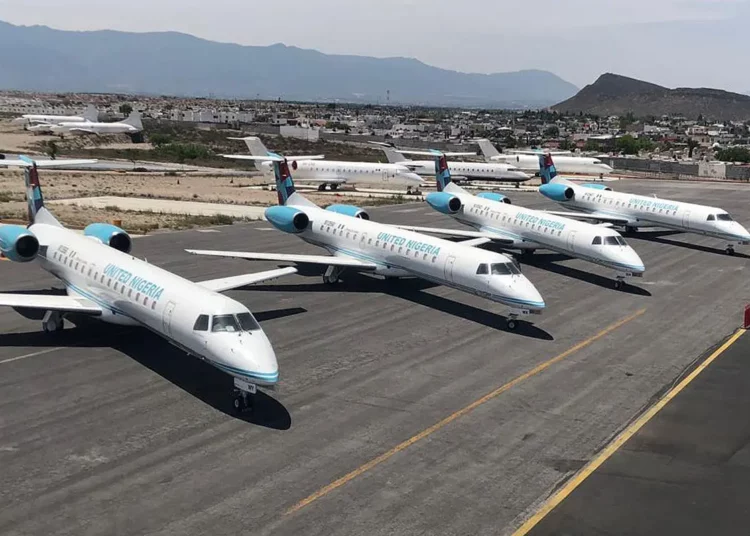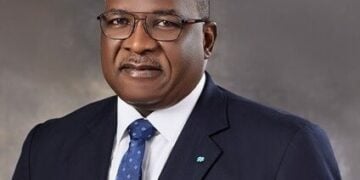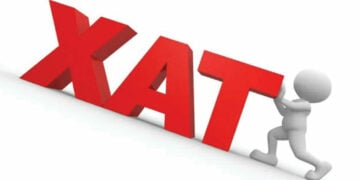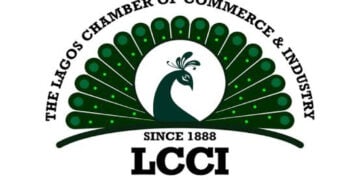Insurance premiums paid on indigenous aircraft by operators in Nigeria are eight times higher than what foreign airlines pay to insure their aircraft, LEADERSHIP has learnt.
It was further gathered that what is currently used to insure eight planes outside Nigeria is used to insure only one aircraft in the nation’s aviation sector, thereby affecting investors’ bottom lines.
According to Dr Alex Onyema, vice president of Airline Operators of Nigeria (AON), Nigeria is currently stigmatised for the wrong reason, which is affecting the sector.
Onyema, the chairman of Air Peace Airlines, called for a radical change in the premium paid for insurance on aircraft in Nigeria.
“Our country is stigmatised for the wrong services, and it is affecting aviation too. It is affecting the amount of money we pay for insurance. Like I said out there, what is used to ensure eight planes outside Nigeria is what we use to provide only one aircraft. They tell you Nigeria is unsafe, and it is a lie.
“This is a wonderful country, every country has its own share of stupidity and foolishness, which is not limited to Nigeria, but the government is doing something about it, the premium to pay on insurance can change, it will help the bottom lines of the airlines,” he stated.
However, aviation experts have argued that insurance premiums will continue to go up due to the handling of unruly behaviour at the nation’s airports.
Citing the handling of the Ibom Air and ValueJet Airlines incidents at the Lagos and Abuja Airports, respectively, they argued that insurance aircraft lessors already perceive Nigeria as a high-risk market, compelling operators to obtain 100 per cent international insurance cover despite local regulations requiring only 30 per cent local insurance retention.
Speaking to LEADERSHIP, the former executive director of Med-View Airline LTD, Isiaq NaAllah, said if the nation fails to act decisively, the industry risks further profiling by aircraft lessors and insurers, who already perceive Nigeria as a high-risk environment.
According to NaAllah, the K1 and Ms Comfort Emmanson incidents need to be urgently revisited to ensure enforcement and proper accountability.
“The systemic lapses will continue to undermine Nigeria’s aviation credibility. I feel at this juncture, the need to right the wrong is not just urgent but clearly inevitable.
“If we fail to act decisively, we risk further profiling by aircraft lessors and insurers, who already perceive Nigeria as a high-risk environment. The economic and reputational costs are too steep to ignore.
“The two incidents must be urgently revisited to ensure enforcement and proper accountability. Insurers price based on risk. Where there are safety infractions and enforcement is not sacrosanct but negotiable, the damage goes beyond reputation, it comes with economic liabilities,” NaAllah stated.
Also speaking, the chief pilot of defunct Associated Airline, Badamasi, said aircraft insurance will continue to be higher in Nigeria because most of the aircraft operating in the country are aged equipment, but getting spare parts for them is difficult.
According to the former Pilot, insurance companies are fully aware that it’s not easy to get those parts when they are needed. They assume that airlines cut corners in their maintenance systems, thereby contributing to high insurance premiums.
“Aircraft insurance will continue to be higher in Nigeria for the following reasons: the quality of the facility is very important in determining the insurance premiums, the Maintenance status of the aircraft, the Financial position of the airline and the Airport infrastructural decay.
“Most of the aircraft operating in the country are aged equipment. It’s not that an aged aircraft is not safe for flights. A safe aircraft is a well-maintained aircraft. Three things are needed to achieve a well-maintained aircraft, namely: a) maintenance manpower, b) maintenance hangar, and c) readily available spare parts.
“The first 2 requirements are available, but the third one is not readily available. Parts have to be imported. The insurance companies are fully aware that it’s not easy to get those parts when they are needed. They assume that airlines cut corners in their maintenance system. Hence, one of the reasons for the high insurance premiums.”
He, however, said that the audit has shown that some airlines in Nigeria are struggling financially.
“In the past, some airlines’ audits have shown that some airlines are struggling financially. They are just barely keeping their head above the water. Such an airline may cut corners. The insurance companies monitor the airlines to determine their premiums.
“The fourth one is the airport’s infrastructure, the runways and the lighting, and the taxiways and their lighting in most airports are below the standard requirements for safe flights.
“In some airports, light reflectors are used to replace light bulbs. Some of these issues were responsible for the aircraft accidents and incidents in the country. Until all these issues are resolved, aircraft insurance premiums will remain high in Nigeria,” he stated.
Also speaking, the former general secretary, Aviation Round Table (ART), Group Capt. John Ojikutu (rtd) queried the recent happenings in aviation security at the nation’s airport.
“What do you expect with what is happening to our Aviation Security that is Airport Security and In-flight Security? Insecurity in any of these in our country would definitely increase the insurance premiums on aircraft and flights.
“If you are talking about the domestic airlines’ aircraft, wait for the foreign airlines. This is one area that the minister’s interference could not see as if the government will be the one to pay for aircraft leasing for the domestic airlines in case of any defaults.” He said.





